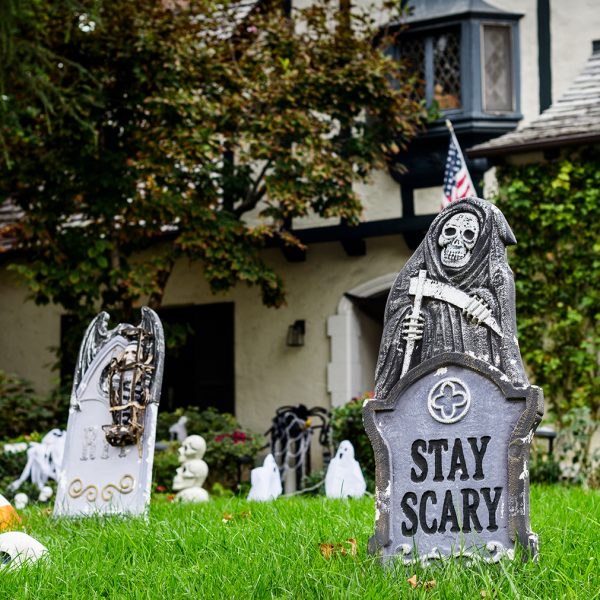The role of the Board of Directors in a condominium, homeowner (HOA), or townhome Association is to preserve, protect, and enhance the community. Accordingly, it is important for the Board to keep its members informed and supported. As Autumn festivities begin to pop-up and with Halloween around the corner, the Board of Directors should prepare itself to be the first station of information for its residents.
Board members must understand that everyone celebrates the Fall season differently, particularly when it comes to Halloween. While one resident may consider decorating changing the wreath on their door, another resident may take the opportunity to transform their home into a haunted graveyard equipped with caskets, headstones, and strobe lights. Recognizing that it may be a challenge to reconcile the differing levels of celebration within a single community, the Board should be proactive and craft the Association’s rules, regulations and expectations.
Below are five tips Boards should consider to keep residents informed and make it possible for families to trick or treat safely.
1. Consider setting hours for trick or treating consistent with your local municipality
The idea of setting hours for trick or treating is not a novel idea, but when doing so, it is necessary to consider setting them consistently with the local municipality. If the Association follows this step, it can avoid confusion, misapplication, and complaints along with the need to police trick-or-treaters.
2. Approach decorating reasonably
Board member shouldn’t focus their energy solely on October 31st. The Halloween season provides opportunity for creative decorations that can be a source of pride for homeowners.
If the Association wants to avoid a homeowner from celebrating the Halloween holiday from August to early December, the Board should consider giving community members a window of time when they are permitted to install decorations. A clearly communicated and firm deadline can help ensure that everyone is respected in the process.
3. Lighting and tripping hazards
Your association may consider restrictions on flashing or extremely bright lights if there are concerns about the lights triggering seizures, distracting drivers, or simply preventing sleep. Having rules in place will be helpful – sooner rather than later.
Similarly, animatronic and inflatable decorations require power to operate. However, it is important for walkways to be clear of extension cords and other tripping hazards. Excited trick-or-treaters hurrying from door to door in the dark can easily miss a cord on the sidewalk, especially if they have a mask on. Consequently, the Board may want to consider requirements addressing a homeowner’s cords/wiring usage.
4. Parking and Noise
Halloween parties are bound to take place throughout the neighborhood and at different times of the day. Board members should remind residents of the rules on parking and noise levels so that owners understand the Association’s expectations.
5. Enjoy the season!
Holidays can bring the community together. Celebrating the Halloween season can represent a much-anticipated community tradition, especially as a kick-off the other Fall and Winter holidays like Thanksgiving and Christmas.
Organizing a safe community event allows residents to mingle and create long-lasting memories with their neighbors. While Board members should consider creating Halloween-specific rules, they should keep in mind that the Association’s end goal should prioritize safety without diluting fun.
If your association has questions regarding promoting a safe and fun Halloween in your community, do not hesitate to contact our firm. Please call 855-537-0500 or visit www.ksnlaw.com.
Since 1983, KSN has been a legal resource for condominium, homeowner, and townhome associations. Additionally, we represent clients in real estate transactions, collections, landlord/tenant issues, and property tax appeals. We represent thousands of clients and community associations throughout the US with offices in several states including Florida, Illinois, Indiana, and Wisconsin.
Please note the material contained in this article is for educational and informational purposes only and does not constitute legal advice. No attorney-client relationship is established by your review or receipt of the information contained in this article. You should not act on the information discussed in this article without first obtaining legal advice from an attorney duly licensed to practice law in your State. While KSN has made every effort to include up-to-date information in this article, the law can change quickly. Accordingly, please understand that information discussed in this article may not yet reflect the most recent legal developments. Material is not guaranteed to be correct, complete, or up to date. KSN reserves the right to revise or update the information and statements of law discussed in the article law at any time, without notice, and disclaims any liability for your use of information or statements of law discussed on the article, or the accessibility of the article generally. This article may be considered advertising in some jurisdictions under applicable law/s and/or ethical rules/regulations. © 2020 Kovitz Shifrin Nesbit, A Professional Corporation.

